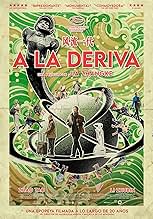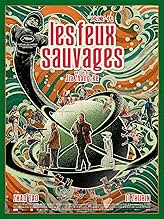Uma mulher chinesa vive em silêncio, celebrando a próspera Belle Epoque com músicas e danças.Uma mulher chinesa vive em silêncio, celebrando a próspera Belle Epoque com músicas e danças.Uma mulher chinesa vive em silêncio, celebrando a próspera Belle Epoque com músicas e danças.
- Direção
- Roteiristas
- Artistas
- Prêmios
- 7 vitórias e 15 indicações no total
- Direção
- Roteiristas
- Elenco e equipe completos
- Produção, bilheteria e muito mais no IMDbPro
Avaliações em destaque
What I like about Jia Zhangke is that his works of Chinese cinema is highly interesting and something that feels so different to any other filmmakers in China. In many ways, using strange digital camera approaches, approaches on themes, the music, the characters and setting. This movie feels like a statement of his career, in a documentary and fiction fashion, it's a mesmerizing experience.
Using archive footage and blending both non-linear fiction and non-fiction, Zhangke presents a melancholic and avant-garde narrative and atmosphere that is filled with wonderful presentations and themes explored. Presenting characters, performances, music, and dialogue that feels realistic and almost as if you are observing the daily lives of an individual and nature of human beings.
Zhao Tao continues to shine with her natural performance and language with each scene she is displayed on, the soundtrack choices are interesting, and the whole fiction vs nonfiction scenario, while it will put off many viewers, I found it to be interesting and a great experiment of a story.
I don't suggest this as the first movie to watch for Jia Zhangke though, but I say it's amazing.
Using archive footage and blending both non-linear fiction and non-fiction, Zhangke presents a melancholic and avant-garde narrative and atmosphere that is filled with wonderful presentations and themes explored. Presenting characters, performances, music, and dialogue that feels realistic and almost as if you are observing the daily lives of an individual and nature of human beings.
Zhao Tao continues to shine with her natural performance and language with each scene she is displayed on, the soundtrack choices are interesting, and the whole fiction vs nonfiction scenario, while it will put off many viewers, I found it to be interesting and a great experiment of a story.
I don't suggest this as the first movie to watch for Jia Zhangke though, but I say it's amazing.
The photography was superbe, grandiose or intimate, always striking. OTOH, I (and my date) was unable to follow the story at all. Perhp[as if I knew more about Chinese geography and social customs it would have made more sense, but as it was it left me with nothing more than a huge dark question mark covering over any thought I might have had about the film, a physical rejection of the sound level of ports of it, but also with a trove of images - both nature, man-made, and of haunting faces that will not soon fade away. The one thing that provided some unity came to me afterward when I thought about the title and realized that the movement of the film is analogous to the tide -- washing out to sea bringing all kinds of things from elegant boats to detritus with it, then flowing back upstream.
This one is the real deal; our esteemed director (all of his projects are foremost "director's films") is one of the greats whom you can discuss in the same breath as Vigo and Varda without puffery.
Jia has a tremendous feel for the Chinese people and is able to capture the textures and rhythms of life there like few others I know. It's this humanity and curiosity, combined with incisive wit and subtle indictment of hypocrisy, that allow him to sidestep censorship of politicized content.
This movie could have been a slight and indulgent scrapbook, but the cast and creative teams--working over an extended schedule to make 'Boyhood' blush--keep the whole thing pitch perfect. Like that earlier milestone film, it's a movie almost without any big moments... and yet there is a vast catharsis that fills in during its latter half.
By the time it gets to the last shot, which I now count among my favorite final shots in cinema history, it achieves a sweeping and yet deeply personal sense of determination in the face of the unknown future we all face. I recommend you see it with a lot of people at a cinema.
Jia has a tremendous feel for the Chinese people and is able to capture the textures and rhythms of life there like few others I know. It's this humanity and curiosity, combined with incisive wit and subtle indictment of hypocrisy, that allow him to sidestep censorship of politicized content.
This movie could have been a slight and indulgent scrapbook, but the cast and creative teams--working over an extended schedule to make 'Boyhood' blush--keep the whole thing pitch perfect. Like that earlier milestone film, it's a movie almost without any big moments... and yet there is a vast catharsis that fills in during its latter half.
By the time it gets to the last shot, which I now count among my favorite final shots in cinema history, it achieves a sweeping and yet deeply personal sense of determination in the face of the unknown future we all face. I recommend you see it with a lot of people at a cinema.
A meditation on love and passing time; a woman searches for her lost lover within the rubble of a deconstructed city as well as her own shattered memory, the Three Gorges Dam consumes cities whole just as time swallows people, women sing and dance in joy and hurt, and dreams surface and submerge again. Lives are changing, and we often don't notice.
Utilizing primarily b-roll and outtakes from previous films, Zhang-ke weaves a cerebral and imaginative tale. While I wish the material was all new and put together with more of a cohesive story in mind, I can't deny that Zhang-ke has a magical and mesmerizing touch in all that he does, even in his wandering. Seen at the Toronto International Film Festival.
Utilizing primarily b-roll and outtakes from previous films, Zhang-ke weaves a cerebral and imaginative tale. While I wish the material was all new and put together with more of a cohesive story in mind, I can't deny that Zhang-ke has a magical and mesmerizing touch in all that he does, even in his wandering. Seen at the Toronto International Film Festival.
10lk-31311
One of Jia Zhangke's best movies. The best of his works are mainly those documentary-like films with deep reflections on modern China and its ordinary, often invisible people caught in the tide of the country's transformation over the past four decades. I spent over 30 years in China, from 1980s to early 2010s. You may not find dramatic plots in this movie, but many of the scenes reflect what I experienced and witnessed there. This movie feels like a collage, bringing back memories of my life over the past three decades.
Most of the scenes feel both real and surreal from today's perspective-especially when you think about how fast and dramatically Chinese society has evolved, along with how people's lifestyles and mindsets have shifted with the tides of time.
Most of the scenes feel both real and surreal from today's perspective-especially when you think about how fast and dramatically Chinese society has evolved, along with how people's lifestyles and mindsets have shifted with the tides of time.
Você sabia?
- CuriosidadesJia Zhang-ke incorporated footage and outtakes from previous films he had directed into this one, including Prazeres Desconhecidos (2002), Em Busca da Vida (2006), and Amor Até as Cinzas (2018). About 10 scenes from this film had previously appeared in the aforementioned movies.
Principais escolhas
Faça login para avaliar e ver a lista de recomendações personalizadas
Detalhes
Bilheteria
- Faturamento bruto nos EUA e Canadá
- US$ 289.713
- Fim de semana de estreia nos EUA e Canadá
- US$ 32.093
- 11 de mai. de 2025
- Faturamento bruto mundial
- US$ 321.256
- Tempo de duração
- 1 h 51 min(111 min)
- Cor
- Mixagem de som
- Proporção
- 1.85 : 1
Contribua para esta página
Sugerir uma alteração ou adicionar conteúdo ausente























